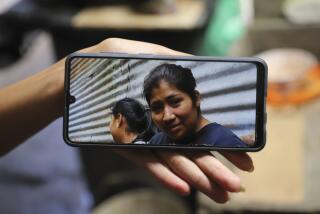An Objection Must be Raised
- Share via
The murder of six Jesuit priests in El Salvador last month remains an open sore between that country and the United States. And the Bush Administration has not helped matters any with its insensitive handling of the only known witness to the killings.
Lucia Barrera de Cerna, a cleaning women at the Jesuit-run university where the murders took place, was sleeping in a room adjacent to the courtyard when the priests and two women bystanders were brutally executed. Cerna, who survived only because her presence was not known to the killers, said she awakened to hear shouting, beatings and, finally, gunshots as the murders take place, and saw that they were carried out by men wearing uniforms. Her account supports widely held suspicions that the executions were the work of Salvadoran security forces.
Because of the public outrage in this country over the killings, the U.S. government has been pressuring El Salvador’s President Alfredo Cristiani--whose government is sustained by more than $1 million a day in U.S. aid--to bring the killers to justice. Once Cerna came forward with her story, she and her family were hustled out of El Salvador under U.S. diplomatic protection, and taken to Miami. Since then, some very disturbing questions have been raised about how she was interrogated and how her account is being used.
Initially, anonymous officials in both Washing-ton and San Salvador reported that Cerna was proving a less reliable witness than anticipated. It was also suggested that she had failed lie-detector tests. But now it turns out that Cerna was held under circumstances that--to put it mildly--were not quite the American way.
After being questioned for one day by Spanish-speaking FBI agents, Cerna was interrogated in Miami for another three days by a Salvadoran colonel, with FBI agents and State Department officials present. Note that (a) Salvadoran soldiers are the prime suspects in the case and (b) therefore the colonel who questioned her in effect represented everything the already frightened woman was afraid of.
What’s going on here? Have U.S. officials forgotten that no Salvadoran officer has ever been convicted of a human-rights abuse, despite having been linked to many offenses during this bloody, 10-year-long civil war? This well-known fact alone would seem reason enough to argue against the grilling of Cerna by a Salvadoran officer; at the very least, the interrogation should have been handled more carefully.
Congress, which may wind up investigating the Jesuit murders, should immediately look into how the U.S. government treated a key witness in the case.
More to Read
Sign up for Essential California
The most important California stories and recommendations in your inbox every morning.
You may occasionally receive promotional content from the Los Angeles Times.










